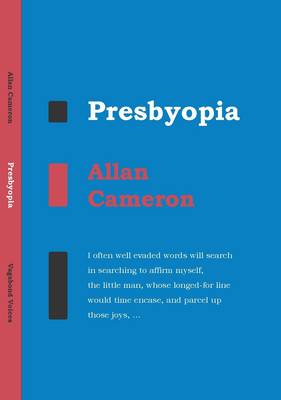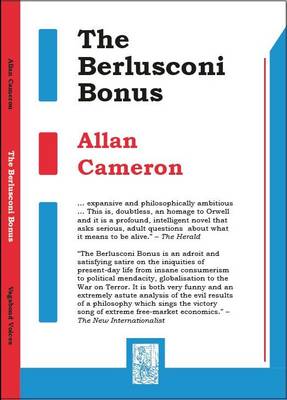Vagabond
2 primary works
Book 4
"My sight if fades and fading faded forms reveals; ageing looks beyond its age to shrivelled centuries beyond decades." The presbyopic poet cannot focus on "the self as subject", but only on what is distant. This collection of poetry attempts to detach the writer from the obsessions that have dominated poetry for so long: sentiment, love, feelings and the autobiographical in general. To completely dispose of these would be dogmatic, and Cameron argues that some of the greatest poets are both presbyopic and myopic. "And yet he fell apart, and headstrong held to that one truth, while falling and parting for his way, his lonely way of wanting justice for the damned." This poetry is unfashionably but unashamedly political and philosophical. Cameron continues to express in another form the contempt he feels for utilitarianism in general, and in particular its crude and extreme variety, as peddled by neo-conservative politicians and their intellectual bag-carriers. At the same time, he attempts to invent new poetic forms.
Inspired by some Italian poets (especially Eugenio Montale), he uses metre and some rhyme, but then breaks it up by introducting enjambement and internal rhymes as well. There are English influences too: most surprisingly Rudyard Kipling's "Mary Gloster" in part inspired "Zarathustra's Last Interview", the longest narrative poem in this collection. "We thank thee Lord for having made us free to rule the world and liberate its inner need to be so much more like us." This poetry is unashamedly anti-imperialist. "That war with wings of death does twist and crush and kill the flimsy leathered bag of flesh and bone and liquid life that spills upon the sands, requires no second telling." This poetry is unashamedly anti-war. "Only this empty moment which I spectate is in my clasp; amongst this fractured stillness, something knowable comes close and just eludes the closing fingers of my mind's grasp" This poetry is for those who have more doubts than certainties.
Inspired by some Italian poets (especially Eugenio Montale), he uses metre and some rhyme, but then breaks it up by introducting enjambement and internal rhymes as well. There are English influences too: most surprisingly Rudyard Kipling's "Mary Gloster" in part inspired "Zarathustra's Last Interview", the longest narrative poem in this collection. "We thank thee Lord for having made us free to rule the world and liberate its inner need to be so much more like us." This poetry is unashamedly anti-imperialist. "That war with wings of death does twist and crush and kill the flimsy leathered bag of flesh and bone and liquid life that spills upon the sands, requires no second telling." This poetry is unashamedly anti-war. "Only this empty moment which I spectate is in my clasp; amongst this fractured stillness, something knowable comes close and just eludes the closing fingers of my mind's grasp" This poetry is for those who have more doubts than certainties.
Book 6
Allan Cameron's intriguing novel is set in a near future where the predictions of the US theorist Francis Fukuyama have been taken to their logical conclusions. Fukuyama declared that, with the collapse of the USSR and the hegemony of neoliberal capitalism, history has come to an end. In Cameron's book, history has indeed been halted by decree and the citizens live in a permanent present of spurious consumer choice and endless material consumption, their bovine lives ruled by the embedding of Rational Consumer Implant Cards in their brains. A cardless underclass exists in the Fukuyama Theme Parks, vast squalid concentration camps on the outskirts of cities. At the pinnacle of this society sit those lucky individuals who, because of their dedicated pursuit of stupendous wealth, are awarded the Plutocratic Social Gratitude Award, popularly nicknamed the Berlusconi Bonus as it effectively puts the recipient beyond the law. The book takes the form of a confession by Adolphus Hibbert, a recent beneficiary of the Berlusconi Bonus, who is recruited by the sinister secret police officer Captain Younce to spy on dissident elements.
Adolphus embarks on a dizzying journey among the clandestine opposition, in which he finds love, betrayal and violence; discovering terrifying truths about himself and his society.A" - New Internationalist
Adolphus embarks on a dizzying journey among the clandestine opposition, in which he finds love, betrayal and violence; discovering terrifying truths about himself and his society.A" - New Internationalist

